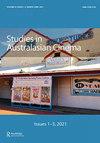The Female Voice in Low budget, independent cinema of Australia: Strange Colours, The Second & Hot Mess
IF 0.7
0 FILM, RADIO, TELEVISION
引用次数: 0
Abstract
ABSTRACT This study investigates the impediments that Australian, female, independent filmmakers face in bringing female-centred stories onto the screen. In 2016, the federal screen funding agency Screen Australia launched Gender Matters to better understand the many barriers facing women filmmakers and create opportunities for female screen creatives to gain equity in the screen industries. But how have this impacted and improved conditions for female filmmakers? The authors of this current study are female screenwriters, directors and producers who have experienced and witnessed the many difficulties women face in the Australian screen industry. The article comprises case studies of recent, successful, female, independent feature filmmakers, the AACTA Award nominated creators of Strange Colours, The Second and Hot Mess. The research explores emergent themes and recommendations based on interviews with the filmmakers. They observe that while some impediments in the low budget, independent sector continue, others have subsided and a considerable number of promising developments are emerging. Screen Australia’s Gender Matters and other initiatives by State-based screen agencies have encouraged this progress, but changes in the global socio-cultural discourse have also been influential.澳大利亚低成本独立电影《女声:奇怪的颜色》、《第二次和热门的混乱》
本研究调查了澳大利亚女性独立电影人在将以女性为中心的故事搬上银幕时所面临的障碍。2016年,联邦电影资助机构“澳大利亚银幕”(screen Australia)发起了“性别问题”(Gender Matters),以更好地了解女性电影人面临的许多障碍,并为女性电影创意人员创造机会,在电影行业获得平等。但这是如何影响和改善女性电影人的条件的呢?本研究的作者是女性编剧、导演和制片人,她们经历并目睹了女性在澳大利亚电影行业面临的许多困难。这篇文章包含了最近成功的女性独立电影制片人的案例研究,以及获得AACTA奖提名的《奇怪的颜色》、《第二部》和《混乱》的创作者。该研究在采访电影制作人的基础上探讨了新兴主题和建议。他们注意到,虽然低预算独立部门的一些障碍继续存在,但其他障碍已经消退,并且出现了相当数量的有希望的发展。澳大利亚电影公司的“性别问题”和国家电影机构的其他倡议鼓励了这一进展,但全球社会文化话语的变化也产生了影响。
本文章由计算机程序翻译,如有差异,请以英文原文为准。
求助全文
约1分钟内获得全文
求助全文

 求助内容:
求助内容: 应助结果提醒方式:
应助结果提醒方式:


